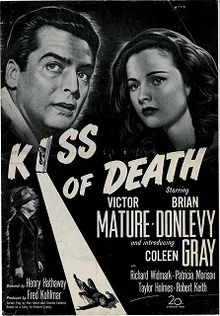
KISS OF DEATH
US, 1947, 98 minutes, Black and white.
Victor Mature, Brian Donlevy, Coleen Gray, Richard Widmark, Karl Malden, Mildred Dunnock, Millard Mitchell.
Directed by Henry Hathaway.
Kiss of Death is considered something of a classic. It features Victor Mature in a very good role as a former convict trying to go straight, in contact with the DA, played by Brian Donlevy. However, Richard Widmark was introduced in this film, won a Golden Globe as the most promising newcomer of the year – and is memorable as a sadistic man, a stupid laugh, and pushing a wheelchaired lady down a flight of stairs.
The film was directed by Henry Hathaway, who directed a number of docudrama-style films at this particular time: Call Northside 777, The House on 92nd Street, 13 Rue Madeleine – with themes of war, espionage, police.
The film was remade in the 1990s with Nicolas Cage and David Caruso.
1. The tone and significance of the title, the atmosphere of revenge and death? Title indicating themes?
2. The film is considered a classic thriller. How typical of forties film-making was it? Does it deserve its reputation?
3. Comment on the value of the black and white photography, the New York location, the documentary tone and background, the emphasis on realism, commentary and the personal touch, the presentation of standard values?
4. Initial sympathy for Nick and his being a prisoner with a record? How did this change during the robbery?
5. The staging of the robbery and its impact, chance, the desperate nature of escape? How realistic was this and convincing?
6. The effect of the trial and prison life on Nick? his encounter with T~ and the irony of its future development?
7. Wick’s devotion to his children? The importance of the effect of his wife’s suicide on him? The influence of this on his decision to be a spy? Was he justified?
8. The crooked lawyer and hie using of Nick? The false promises?
9. How well were the police presented in the film? Especially de Angelo?
10. Did the police have the right to use Nick? The importance of his decisions and the way that this was presented visually? What motivated him? The nature of the danger? The importance of police protection? Nick’s attitude towards this?
11. Was the realism and the criminal atmosphere balanced well by the human wide of the drama? Nettie and her devotion to Nick? His visiting his children at the stage, the playing of the piano? The setting up of a home and living an ordinary life?
12. The presentation of Tommy as a paranoid criminal? Richard Widmark at the beginning of his career of such criminals? Was he a convincing character? The famous murder of the woman pushed down the stairs?
13. The irony of Nick’s testimony not being able to get a conviction? The comment on the difficulties of justice?
14. How well portrayed were Nick’s fears. for his family and himself, the waking in the night, the alert for the car? Did this give credibility for his decision to act alone?
15. How convincing was the climax? His willingness to give his life for the family? The death of Tommy? Was the final act by Nettie credible and convincing for this kind of film?
16. What impact does this kind of film have now? Does it seem to belong to a past style? Does this matter?